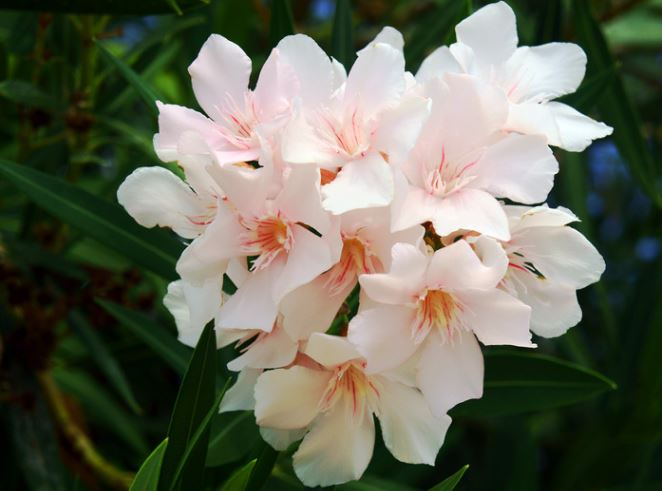Kerala Temples Ban Oleander After Woman’s Death
Following the tragic death of a 24-year-old woman, Surya Surendran, who accidentally consumed oleander leaves, two major religious temple boards in Kerala have imposed a ban on the use of oleander flowers in temple offerings.
The incident occurred when the victim, unknowingly chewed oleander (locally known as Arali in Kerala) leaves, leading to severe poisoning and her subsequent death. This prompt action by the Travancore Devaswom Board and the Malabar Devaswom Board aims to prevent future incidents by restricting the flower’s use in religious offerings and prasad.
Oleander Plant and Its Risks
Nerium oleander, commonly known as oleander, is a highly toxic plant despite its widespread cultivation for ornamental purposes. All parts of the plant, including leaves, stems, flowers, and roots, contain potent cardiac glycosides that can cause severe poisoning.
Symptoms of oleander toxicity include nausea, vomiting, abdominal pain, diarrhoea, irregular heart rate, and even death in severe cases. Oleander poisoning can occur through ingestion, inhalation of smoke from burning the plant, or contact with skin. Despite its danger, oleander remains popular in landscapes for its attractive flowers and drought resistance.
The recent death highlights the plant’s lethal potential, leading to need for increased public awareness and regulatory responses.
Oleander in Traditional Medicine and Its Dual Nature
As per Ayurvedic Pharmacopoeia of India, the parts of the oleander plant have been used in Ayurveda for treating various skin conditions and as a component in several other remedies. Historical texts describe its application in treating stubborn skin diseases and other ailments. However, medical experts strongly caution against its unchecked use due to the narrow therapeutic window and high toxicity.
Safety Measures Following Oleander Poisoning
Immediate actions following the ingestion of any part of the oleander plant are crucial. It is advised to rinse the mouth to remove any plant residue and to consume ample fluids to aid in detoxification.
Hospital admission is often necessary to manage the symptoms, which can persist for several days. Timely medical intervention can generally lead to recovery, although severe cases can be fatal.
About Ayurvedic Pharmacopoeia of India
The Ayurvedic Pharmacopoeia of India (API) is an official document issued by the Government of India which outlines standards for Ayurvedic drugs and substances. It specifies the quality, purity, and strength of ingredients used in Ayurvedic medicine, ensuring safety and efficacy.
The API serves as a benchmark for Ayurvedic practitioners, researchers, and manufacturers, detailing the preparation of compounds and dosages. It includes monographs on plants, minerals, and other substances, featuring botanical information, chemical constituents, and therapeutic uses, crucial for standardizing Ayurvedic practices and product manufacturing.
Month: Current Affairs - May, 2024
Category: India Nation & States Current Affairs








